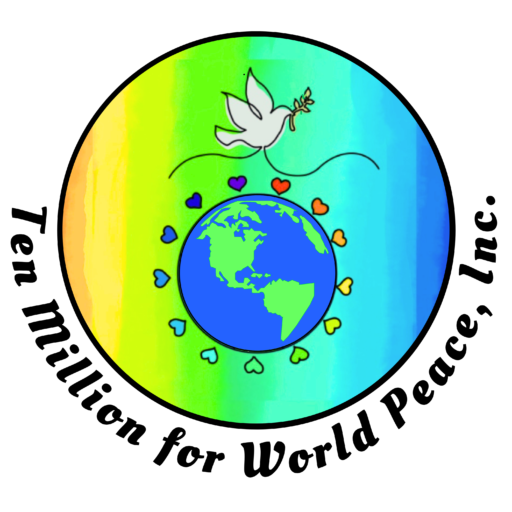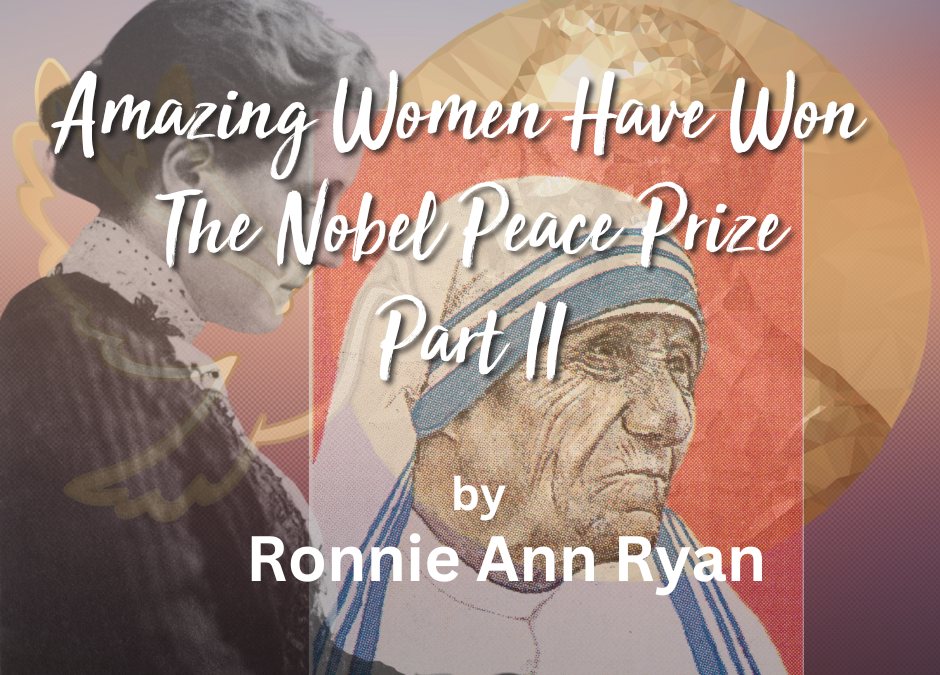This is the second article in a 3-part series about female Nobel Peace Prize winners who inspire people today to strive for peace. Over the years, 18 incredible women so far, have received this monumental award. They have championed the cause in various ways, aiming for non-violent solutions in challenging situations.
Alfred Nobel founded the Nobel Prize foundation. Everything was spelled out meticulously in his will and this same process, which began back in 1895, is still followed today. Below, you’ll find six more remarkable women who have been awarded peace prizes by this illustrious foundation.
1. Alva Myrdal – Sweden, 1982.
Alva held several positions with the United Nations after World War II, including UNESCO’s social science section. In her role as government minister in charge of disarmament for a non-aligned Sweden, she fought for nuclear weapons-free zones in Europe and to convince countries to disarm.
She shared her Nobel Peace Prize with Alfonso Garcia Robles for their work towards disarmament and nuclear weapon-free zones. Her distinguished career continued by being elected to the Swedish legislative assembly in 1962.
2. Aung San Suu Kyi – Burma/Myanmar, 1991.
After returning home from studying abroad in 1988, Aung San Suu Kyi led the opposition to a military take over that began in 1962. The daughter of the legendary liberation movement, she was one of several who founded the National League for Democracy (NLD). Following in the footsteps of Mother Teresa, she was against the use of violence.
In 1989, she was arrested and held under house arrest. Then in 1990, the NLD won the election. Unfortunately, the military kept the assembly from convening, arresting more members of the opposition. Sadly, the struggle continues, and while Aung San Suu Kyi was released, she was re-arrested in 2021.
However, her Nobel Peace Prize did work to attract world opinion in favor of this democratic cause for the people of Burma, now called Myanmar.
3. Rigoberta Menchu Tum – Guatemala, 1992.
Based on her work for the rights of indigenous people and striving to reconcile ethnic groups, Rigoberta Menchu Tum received the Nobel Peace Prize in 1992. She grew up in a country that suffered from intense violence and quite a few of her own family members were casualties in the crossfire.
Moving to Mexico in the 1980s, she met some European groups who were working for human rights in Latin America. With Norway on board as the intermediary, reconciliation was negotiated between the guerilla organization and the government, with an agreement in 1996.
After all her perseverance, Rigoberta became a UN Ambassador for the world’s indigenous people, continuing her efforts on their behalf.
4. Jody Williams – United States, 1997.
The International Campaign to Ban Landmines (ICBL) is an organization that was started in 1991. Their aim was to create an international ban on landmines and urge governments to clear out those still hidden in the land.
This is essential as 25,000 people are still killed annually from mines planted in wars long ago. Jody Williams headed up this powerful group and shared her 1997 prize with the ICBL. At that time, 120 countries signed the Ottawa Convention which banned the use of landmines, an incredible accomplishment.
5. Shirin Ebadi – Iran, 2003.
One of Iran’s first female judges, she was dismissed after Khomeini came to power in 1979. Then she started defending people who were persecuted and ended up in jail herself as a result in 2000.
She was awarded the Nobel Peace Prize for her human rights work, especially for women and children, and also noted for her work towards democracy.
After the terrorist attack on the U.S. on September 11, 2001, the Nobel Committee chose Shirin not only for her good work, but also hoping to mitigate tension between the Islamic and Western worlds. In addition, the committee’s goal was to support to the Iranian reform movement.
6. Wangari Muta Maathai – Kenya, 2004.
The first Nobel Peace Prize awarded to an African woman went to Wangari Maathai for her “contribution to sustainable development, democracy and peace.” This pioneering woman was also the first to receive her doctorate in biology, and the first female professor in her homeland.
Maathai took part in promoting democracy in Kenya. She also started a grass-roots group called the Green-Belt Movement to end deforestation of land which threatened their agricultural way of life. The group educated people about ecology and encouraged the planting of trees.
The Nobel Committee acknowledged that her efforts showed that she could think globally and see the big picture, while taking action and making things happen on the local level.
More Female Prize Winners
Read about the first six women to receive the peace prize in this post (create a link here). And keep your eyes open for the last of this three-part series, extolling the remaining 6fabulous female winners.
Author: Ronnie Ann Ryan MBA, CCC, an Intuitive Coach and Wise Woman who quickly zeros in on the heart of the matter. She offers practical solutions to business and life issues using her well-honed intuition, so you can enjoy a more balanced life. Also a Past Life Reader, Soul Intelligence Energy Healer, and Bestselling Author with six books, Ronnie hosts the popular podcast Breathe Love & Magic which made it to the top 10% globally! If you want the intuitive edge to find the magic in your business and life, visit https://IntuitiveEdge.biz

